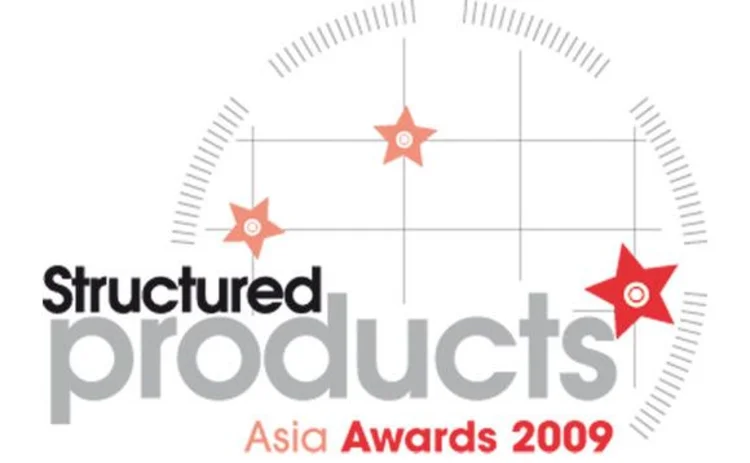
Best in Taiwan - Standard Chartered Bank
If all regions in Asia have suffered as a result of the Lehman Brothers collapse, then Taiwan, where sales have almost ground to a halt more than once over the past 12 months, might well be the toughest place in which to resurrect the retail industry. On the back of thousands of complaints to regulatory authorities from investors regarding worthless Lehman-backed products, many distributors have decided it is easier to simply shut up shop and focus on other areas of investment or countries

Standard Chartered has never distributed a Lehman-backed product, and continues to maintain its distribution business as well as its dialogue with the financial regulator. The desertion of structured products by other banks has left StanChart free to net a 45% share of the local structured products market in 2009.
Needless to say, it has not been an easy 12 months, even before the Lehman collapse. Competing banks took up the attractive funding rates on offer from the ailing bank, which meant StanChart's sales volumes took a hit. In hindsight refusing to distribute Lehman product turned out to be an excellent call. "In 2008, a lot of banks were chasing after Lehman to launch their structures, because the yield was attractive," says Vicky Kong, general manager, wealth management and premium banking, consumer banking at StanChart in Taipei. "A lot of our salespeople came to us and asked why we didn't have these types of notes. But we are now very proud to tell regulators and our boards that we did not have any notes issued by Lehman."
The avoidance of the structures was down to the distributor's rigorous due diligence, which involved scrutinising the credit default swap (CDS) ratings of issuers. "I think credit goes to my product managers and investment strategy team," says Kong. "They looked at the CDSs from June to August and had a sense as to what the dangerous areas were and what to avoid." Kong does not pretend StanChart had any idea Lehman would later file for bankruptcy, but says it was generally uncomfortable about Lehman and had other choices within group guidelines of who it could select as issuers.
After the collapse, sales were inevitably affected. StanChart took just two months out of the market before launching back into the business. "At that time we went back to the philosophy that we have - there's nothing wrong with structured products in themselves, it's about how you manage them, present them and advise your clients," says Kong. With this in mind, StanChart has been participating with Taiwan's Financial Supervisory Commission and Bankers' Association to develop the new rules and guidelines surrounding structured products. A ban was implemented in late June that has just been lifted, subject to stricter controls on product features and sales processes. "We are amending our internal process guidelines and ensuring sufficient training is given to our salespeople before we go out and resume sales again," says Kong.
StanChart was also pre-emptive in ceasing the sale of non-principal-protected products in 2008, despite the fact the market was shifting increasingly in the opposite direction, which is another way retail clients' interests have been safeguarded. Another development on the product side was the scaling back of tenor. Most interest rate-linked products launched in the Taiwanese market typically have a maturity of around 10 years - this was halved to five years in August 2008 as StanChart endeavoured to protect clients from volatile markets.
The US dollar-denominated product released was a range accrual note linked to US dollar-denominated 10-year constant maturity swaps (CMSs) and the US dollar three-month Libor. For every day that both remained below 5.5%, the investor accrued a coupon of 5.7% annualised, and had the potential to knock out if the CMS fell below 4.5%. The product kicked out in the first quarter of this year, along with several other previous rates-linked tranches that had been launched in 2008. StanChart sold US$30 million worth of the capital-guaranteed product, which was issued by Commonwealth Bank of Australia.
StanChart also raised $300 million on fixed-coupon notes during 2008 and 2009. Structures launched recently have used a fixed and floating-rate design to prevent investors being locked in while rates are low. A 100% capital-guaranteed five-year product issued by Calyon in January pays a rate of 4% fixed for the first year. In the remaining four it pays US dollar three-month Libor plus 1.2%, as a range accrual provided US dollar three-year CMS is greater than the 10-year CMS rate.
"If we don't fight for structured products, or they are deemed to be suspended for a longer period of time, people will just go out to other markets," says Kong. "In other markets such as Hong Kong and Singapore, it's up to the banks to choose whether or not they want to make this product available, which is a much healthier approach."
Only users who have a paid subscription or are part of a corporate subscription are able to print or copy content.
To access these options, along with all other subscription benefits, please contact info@risk.net or view our subscription options here: http://subscriptions.risk.net/subscribe
You are currently unable to print this content. Please contact info@risk.net to find out more.
You are currently unable to copy this content. Please contact info@risk.net to find out more.
Copyright Infopro Digital Limited. All rights reserved.
You may share this content using our article tools. Printing this content is for the sole use of the Authorised User (named subscriber), as outlined in our terms and conditions - https://www.infopro-insight.com/terms-conditions/insight-subscriptions/
If you would like to purchase additional rights please email info@risk.net
Copyright Infopro Digital Limited. All rights reserved.
You may share this content using our article tools. Copying this content is for the sole use of the Authorised User (named subscriber), as outlined in our terms and conditions - https://www.infopro-insight.com/terms-conditions/insight-subscriptions/
If you would like to purchase additional rights please email info@risk.net
More on Awards
Joining the dots: banks leverage tech advancements for the future of regulatory reporting
The continued evolution of regulatory frameworks is creating mounting challenges for capital markets firms in achieving comprehensive and cost-effectiveawa compliance reporting. Regnology discusses how firms are starting to use a synthesis of emerging…
Markets Technology Awards 2024 winners' review
Vendors spy opportunity in demystifying and democratising – opening up markets and methods to new users
Derivatives house of the year: JP Morgan
Risk Awards 2024: Response to regional banking crisis went far beyond First Republic
Risk Awards 2024: The winners
JP Morgan wins derivatives house, lifetime award for El Karoui, Barclays wins rates
Best product for capital markets: Murex
Asia Risk Awards 2023
Technology vendor of the year: Murex
Asia Risk Awards 2023
Best structured products support system: Murex
Asia Risk Awards 2023
Energy Risk Asia Awards 2023: the winners
Winning firms demonstrate resiliency and robust risk management amid testing times







